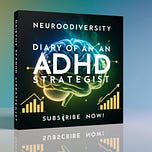When Worlds Collide
Sarah sat in her therapist's office, fidgeting with the zipper on her jacket sleeve, tears streaming down her face. "I don't understand why I can't make this relationship work for me. I love him, but his constant criticism about my forgetfulness, my impulsivity... it's like he can't see that I'm trying my best. When I try to explain my ADHD struggles, he somehow makes it about him."
Her therapist nodded knowingly. What Sarah was describing wasn't just a communication problem—it was the complex intersection of her ADHD and her partner's narcissistic emotional patterns, creating a perfect storm of misunderstood emotional needs.
her ADHD and her partner's narcissistic emotional patterns
What's This All About?
ADHD (Attention-Deficit/Hyperactivity Disorder) is a neurodevelopmental condition characterized by persistent patterns of inattention, hyperactivity, and impulsivity that interfere with daily functioning and personal life development.
Narcissistic Emotional Dysfunction refers to emotional patterns associated with narcissistic personality traits, including an inflated sense of self-importance, need for excessive admiration, lack of empathy, and difficulty recognizing or responding to others' emotional needs appropriately.
When these two conditions intersect—whether in the same person or between people in a relationship—they create unique challenges that go beyond either condition in isolation.
conditions intersect—whether in the same person
Why This Matters
Understanding this intersection matters because it affects millions of relationships, workplaces, and families every single day. People with ADHD often struggle with emotional regulation, rejection sensitivity, and consistent follow-through—traits that can trigger negative responses in those with narcissistic emotional patterns.
For people with ADHD, being involved with someone exhibiting narcissistic traits can lead to:
Intensified shame about their executive functioning challenges daily 💔
Depleted self-esteem from constant criticism of their ADHD symptoms manifesting 🔄
Gaslighting about whether their neurodevelopmental condition is "real" or "just an excuse" 😞
For individuals with narcissistic traits who have ADHD themselves or interact with ADHD individuals:
Their need for control is constantly challenged by ADHD's inherent unpredictable nature 🌪️
Their desire for perfection clashes with ADHD's inconsistent performance creating conflict ⚡
Their fragile self-esteem is threatened by having to accommodate another's neurological differences 🧠
Depleted self-esteem from constant criticism…
…Their need for control is constantly challenged
S5 EP5: ADHD and Narcissistic Emotional Rollercoaster with Marie Birtel
Welcome to ADHD and Narcissistic Emotional Rollercoaster with Marie Birtel, a podcast dedicated to unravelling the intricate connection between ADHD and the profound emotional impact of narcissistic abuse.
The Science Behind It
Research increasingly shows that ADHD and narcissistic traits may have overlapping neurobiological underpinnings and expressions.
A study published in the Journal of Attention Disorders found that adults with ADHD scored higher on certain measures of narcissism, suggesting that some narcissistic behaviors might actually be compensatory mechanisms for managing ADHD-related self-esteem challenges.
Neuroimaging research from the University of California revealed that both conditions show altered activity in the prefrontal cortex, which regulates executive function and emotional responses.
Dr. Russell Barkley, a leading ADHD researcher, notes that emotional dysregulation is a core feature of ADHD, not merely a secondary symptom—making those with ADHD particularly vulnerable to relationships with partners who exhibit narcissistic manipulative behaviors.
emotional dysregulation is a core feature of ADHD
Making It Work: How to Apply This in Real Life
✅ Recognize the Patterns – Learn to identify when ADHD symptoms trigger narcissistic responses, and vice versa. For example, when forgetfulness (ADHD) is interpreted as disrespect or lack of caring (narcissistic interpretation).
✅ Implement Clear Communication Protocols – Establish structured communication methods that accommodate ADHD needs while addressing narcissistic concerns about being respected and heard effectively.
✅ Develop "Pause Buttons" – Create mutual agreements to pause interactions when emotional dysregulation occurs (from either condition) before conflicts escalate dramatically.
✅ Seek Specialized Support – Find mental health professionals who understand both conditions and their interaction, not just one condition.
✅ Create Environmental Accommodations – Design living and working spaces that minimize ADHD friction points that might trigger narcissistic defensive reactions.
Real-Life Examples in Action
Case Study: Michael and Jennifer
Michael (with ADHD) and Jennifer (with narcissistic traits) struggled for years until they implemented specific strategies. When Michael would forget important dates or arrive late, Jennifer previously took it as a personal slight against her importance. Through therapy, they developed a shared digital calendar system with multiple reminders that satisfied Michael's need for external cues and Jennifer's need to feel prioritized and valued.
They also established a "code word" to use when either felt triggered—Michael when feeling shamed for his ADHD symptoms, Jennifer when feeling her needs weren't being acknowledged. This simple tool allowed them to step back and restart conversations from a place of mutual understanding.
Case Study: Workplace Dynamics
In a marketing agency, Tara (with ADHD) reported to Mark (with narcissistic leadership traits). Their working relationship improved dramatically when they implemented a structured feedback system. Rather than Mark becoming frustrated with Tara's disorganization (triggering his need for perfection), they created a project management system with clear milestones. This gave Tara the structure she needed while giving Mark the predictability and excellence he demanded consistently.
"code word" to use when either felt triggered…
…working relationship improved dramatically
Pro Tips & Insider Insights
The 3-2-1 Method: For people with ADHD in relationships with narcissistic individuals, practice sharing 3 things you accomplished, 2 challenges you faced honestly, and 1 area where you need help—this satisfies the narcissistic need for competence while acknowledging ADHD challenges realistically. 🔄
Emotion-Free Zones: Designate specific times and places where problem-solving happens without emotional content—particularly helpful for the ADHD person who needs to avoid rejection sensitivity and the narcissistic person who needs to avoid emotional defensiveness. 🧊
Validation Before Solution: Always validate emotions first before jumping to fixes—especially important as people with ADHD often feel misunderstood and people with narcissistic traits need to feel their perspectives matter significantly. ❤️
The DEAR MAN Technique: From Dialectical Behavior Therapy, this communication framework (Describe, Express, Assert, Reinforce, Mindful, Appear confident, Negotiate) works remarkably well for navigating the complexity of ADHD-narcissism interaction dynamics. 💬
Quick Cheat Sheet: Key Takeaways
🔑 ADHD and narcissistic traits can create uniquely challenging relationship dynamics that require specialized intervention approaches
🔑 Emotional dysregulation is central to both conditions, though it manifests in different ways and for different underlying reasons
🔑 Structured environments, clear communication protocols, and external systems benefit both conditions when they intersect daily
🔑 Professional support from therapists familiar with both conditions is often necessary for sustainable improvement
🔑 Self-awareness about one's own condition is the essential first step before attempting to address relationship challenges
Further Reading (Books & Resources)
📚 "The ADHD Effect on Marriage" by Melissa Orlov – Amazon Link
📖 "Disarming the Narcissist: Surviving and Thriving with the Self-Absorbed" by Wendy T. Behary – Amazon Link
📚 "Is It You, Me, or Adult A.D.D.?" by Gina Pera – Amazon Link
📖 "Rethinking Narcissism" by Dr. Craig Malkin – Amazon Link
Practical Tools & Apps
🔧 Todoist – Task management system that helps ADHD individuals maintain consistency while providing the structure narcissistic traits demand – Website Link
🔧 Calm Harm – App designed to help manage emotional impulses and dysregulation common in both conditions – Website Link
🔧 Gottman Card Decks – Relationship communication tool that structures emotional exchanges in helpful ways – Website Link
🔧 MoodKit – Evidence-based mood improvement tools developed by clinical psychologists – Website Link
Research & Studies Section (Citations & Sources)
Barkley, R. A. (2015). Emotional dysregulation is a core component of ADHD. Attention-Deficit Hyperactivity Disorder: A Handbook for Diagnosis and Treatment, 4th ed.
Fossati, A., Donati, D., Donini, M., Novella, L., Bagnato, M., & Maffei, C. (2017). "Temperament and Character Inventory dimensions and Attention-Deficit/Hyperactivity Disorder symptoms in a sample of adult outpatients: A dimensional approach." Journal of Attention Disorders, 21(14), 1220-1228.
Perroud, N., Hasler, R., Golay, N., Zimmermann, J., Prada, P., Nicastro, R., & Aubry, J. M. (2016). "Personality profiles in adults with attention deficit hyperactivity disorder." BMC Psychiatry, 16(1), 199.
Ronningstam, E. (2020). "Narcissistic functioning and personality disorders: Clinical and conceptual issues." Journal of Personality Disorders, 34(6), 1-17.
Surman, C. B. H., Biederman, J., Spencer, T., Miller, C. A., McDermott, K. M., & Faraone, S. V. (2013). "Understanding deficient emotional self-regulation in adults with attention deficit hyperactivity disorder." Acta Psychiatrica Scandinavica, 128(5), 405-413.
Call-to-Action & External Link
Understanding the intersection between ADHD and narcissistic emotional dysfunction isn't just about knowledge—it's about applying these insights to create healthier relationships and more fulfilling daily experiences. Whether you're navigating these challenges personally or supporting someone who is, remember that awareness is the first step toward positive meaningful change.
Start by implementing just one strategy from this article this week and notice the difference made.
🎧 For more insights, check out this ADHD podcast:

















Share this post